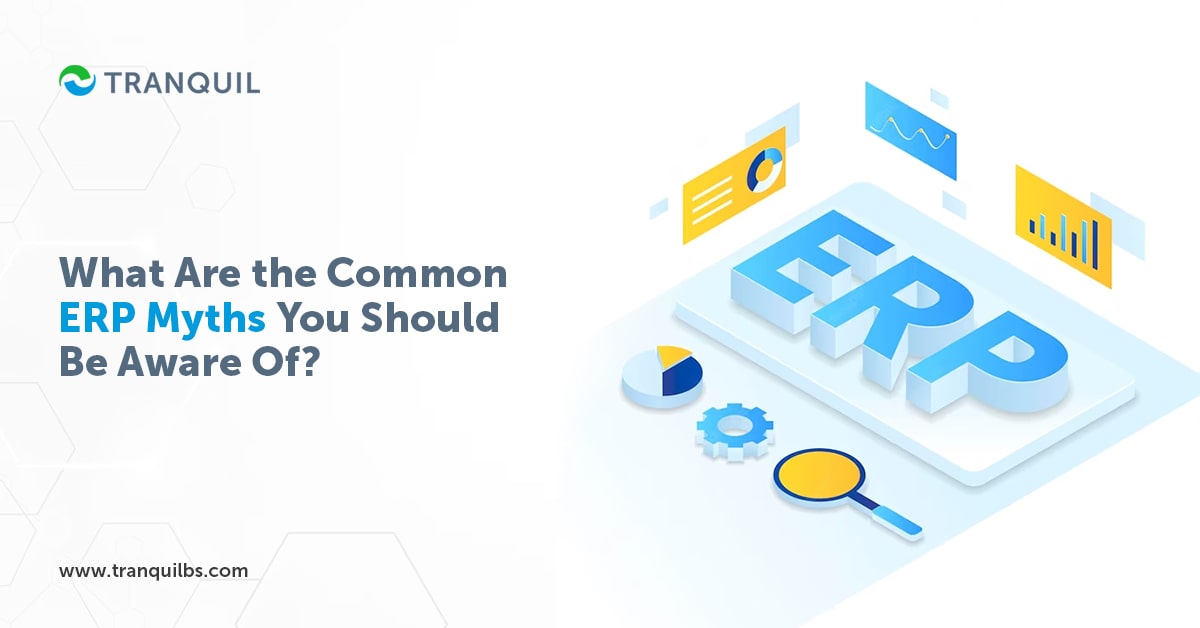
ERP or enterprise resource planning software collects, stores, and data more accurately and efficiently than manual systems.
It integrates disparate business systems and fosters smooth flow of information and improved collaboration between departments.
It gets rid of information siloes and brings together all the data in a single dashboard, giving real-time data access to all employees according to their roles.
ERP enables organizations to minimize errors in data handling by reducing human intervention, saves time, money, and effort, and boosts overall efficiency and productivity.
Today, ERP software is used in every industry, and by small, medium, and large businesses, and even multinational corporations everywhere in the world, making it a multi-million-dollar industry in itself.
Surprisingly, there are still a lot of myths about ERP that people still harbor.
ALSO READ: Influence and Importance of ERP System in Different Industries
Let’s check out the most common ones:
Every business is unique and therefore their requirements are also unique.
Each industry has its own requirements; they are of different sizes as well, and each business within an industry has its specific requirements.
This means that the requirement for ERP modules also differs.
A company manufacturing steel bars in multiple locations, for example, has more complex needs than a standalone retail shop that buys finished goods and sells them.
It’s true that premium ERP solutions with more modules and features can cost a pretty packet; however, with the advent of new technologies like cloud computing and mobile platforms, you can get ERP solutions that are more economically priced.
Nowadays, subscription-based pricing is also available, where businesses can choose packages and only pay for what they need, and how much they need.
ALSO READ: What are the Challenges in ERP Implementation?

While it is true that ERP software was used only by large corporations previously, the same doesn’t hold true today.
In fact, it’s one of the biggest ERP myths that small businesses do not require an ERP solution.
As ERP software becomes more affordable with new technology and pricing models, small businesses can adopt ERP and reap its many benefits.
There are several options available for customizing the solution to suit individual requirements.
It is essential to choose the appropriate ERP solution for the business depending on its size and complexity, so that it can be implemented effectively, and give benefits to the business in the long run.
ALSO READ: Important ERP Implementation Questions to Ask
ERP delivers real-time information and actionable insights that enable top management to take effective decisions for business growth.
These benefits percolate to the lowest level as they often result in enhancing processes and helps in improving employee productivity and performance at various levels.
As ERP software helps to share information across the entire organization, it helps to improve communication and collaboration.
Your top management can plan and implement projects better, eliminate redundant tasks, and reduce costs of procurement and processes.
So, you can see how the software can benefit even the lowest-rung employee.
ALSO READ: Benefits of Having an Employee Self Service System
When it is properly implemented and made use of, an ERP solution allows you to deliver better customer service.
For example, you can make deliveries on time, in the right quantity and quality that the customer ordered, and at an attractive price.
This will definitely impress your customers.
But that does not mean that it is the only or chief purpose of implementing ERP in your business.
It is simply one of the desired and expected outcomes.
With improved operational performance, you can achieve excellent results, and better quality products and services.
This can help your business to improve goodwill and build trust among your customers, forging long-term relationships with them.
ALSO READ: Future of Enterprise Resource Planning

Streamlining internal business processes is one of the biggest benefits provided by ERP systems.
They get rid of informational siloes, bring data into a central database, foster better communication and collaboration, reduce expenses, and boost efficiency and productivity across the organization.
This has a cascading effect, as eventually, it helps to provide superior quality products and services to them.
It also helps in conveying to your customers that you are an efficient and professional organization and builds trust.
Eventually, this results in customer retention as well as the acquisition of new customers.
With better employee productivity, timely wage payments, better training, appraisals, and promotions – all simplified with the HR module in the ERP – you also get happier employees.
Happy employees are more productive as well as loyal, and you can retain the best talent.
They will also make positive contributions to organizational growth.
Thus, you can see that ERP has multifold benefits.
As we had mentioned earlier, the kind of ERP solution your business needs depends entirely on the nature, size, and complexity of your business and of course, your industry as well.
It is imperative that you make a comparison of the various ERP systems available, and see which one is the most suited to your business requirements.
You also need to check if the ERP is scalable and flexible, and can be customized to suit your specific processes.
Previously we compared a manufacturing company with a retailer; but even within manufacturers, there can be vast differences.
For example, a company making only two or three products will have limited needs as compared to a company manufacturing dozens of products, even if they belong to the same industry.
Therefore, the solution that is good for the first company may be woefully inadequate for the second.
If you do choose an off-the-shelf ERP solution, make sure the vendor can customize it to make it suitable for your specific processes and to help you achieve your unique business goals.
ALSO READ: Detailed Guide on ERP in Production Planning
All of the above – supply chain management, customer relationship management, and manufacturing resource planning are all different software solutions that are designed to handle a specific function of the business.
ERP solutions can have all these modules, or we can integrate any of them with the ERP solution depending on your individual needs.
Similar to the cost of ERP implementation, the time taken also depends on numerous factors like the size, type, and complexity of the business, how many users are there, how much customization you need, your expectations from the software, what resources are available, how quickly the employees and management learn and adapt to the new solution, how complex the change is, and what its scope is. Implementation can be as quick as a few weeks, or it can take a couple of years.
For example, a multinational corporation with multiple locations will require a lot more time than a standalone business.
ALSO READ: Accounting Trends

This is again one of the oft-repeated ERP myths.
With any new software or tool, you have to give it time to produce results – you simply cannot rush it.
The same goes for ERP.
You are shifting to a new process; it takes time for the employees to adapt and get used to the new system.
Only after working on it will you be able to know where you are lacking and how you can improve; are you managing the inventory well?
Where can you cut costs?
This will definitely take some time – a minimum of six months at least, to see semblances of change.
But never fear; an ERP system will definitely let you reap rich rewards in the long run.
ALSO READ: How Does Landed Cost Affect the Cost of Inventory?
ERP is basically the work processes in your company being represented in the form of software.
It is designed after understanding your process flow so that it can be simplified and made more efficient.
Therefore, it is not right to say that it is difficult to learn; after all, your employees are very well-versed with your process flows, as they have been working with them for a long time already.
ALSO READ: Debit Note vs Credit Note
Nothing could be further from the truth!
ERP is a business asset, and responsibilities and contributions are required from all the business departments, as well as all rungs of the hierarchy: from the CEO to the workers on the shop floor.
Obviously, IT is a critical part of implementing the solution and maintenance; but every single business function, from procurement and inventory to HR and production, up to sales and marketing have important roles to perform if the ERP implementation has to be successful.

This is another ERP myth that business owners believe, but this is not the case.
ERP software makes the job of management or entrepreneurs simpler; it does not eliminate them from the scene!
Qualified and well-trained professionals with solid knowledge about the product and experience with implementing software are needed to ensure its success.
It is true that ERP software can enhance overall organizational productivity and efficiency on multiple levels.
However, several activities can only be performed with human intervention – decision-making for business growth is the major such activity.
ALSO READ: Supplier Aging vs Customer Aging

ERP software is not a one-and-done thing; as your business grows and customer demands change, you will need to make sure your software is upgraded to reflect the current trends, and include new features to accommodate dynamic market conditions.
Maintenance is necessary to weed out bugs and technical glitches.
Without upgrading and maintaining your software, you will lose the competitive edge you had.
However, with cloud-based ERP like Tranquil, you don’t have to worry about upgrades as we are continuously working on upgrading our software, and our customers automatically get them.
ALSO READ: How Can you Prevent Inventory Stockouts?
Without vendor support, implementing the software can be difficult; you will have to learn it all by yourself and also resolve any issues that crop up.
Make sure that your software vendor is willing and able to provide after-sales support so that you don’t have any hiccups later, like downtime that results in business disruptions, or loss of critical data.
We hope this article has helped clear the air around the myths about ERP software. Interested in knowing more about Tranquil ERP and how it can benefit your business? Contact us right away to talk to our experts. You can also schedule a demo of our software and see how it works.